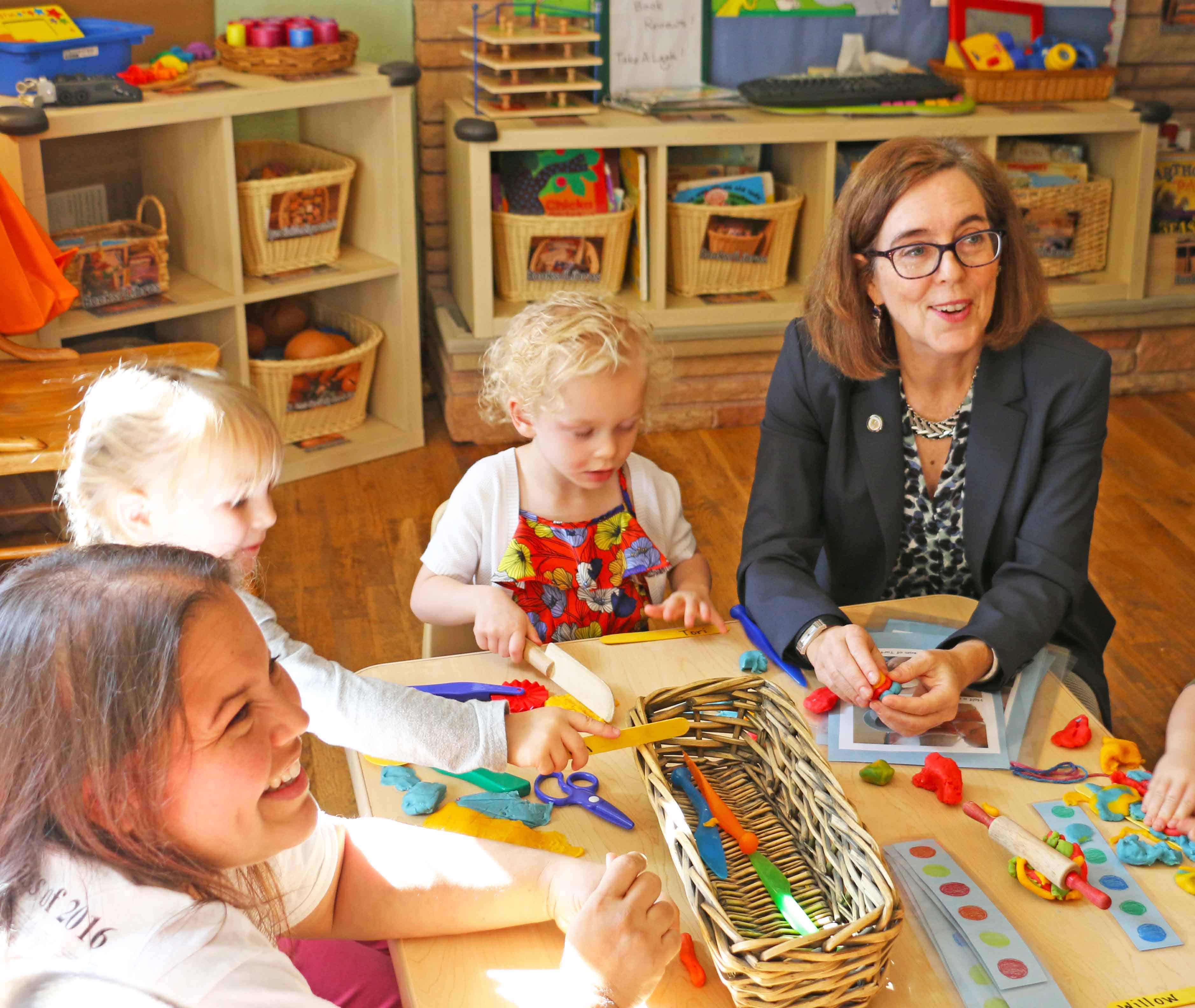On August 13, Children’s Institute (CI) brought together parents, advocates, and CI board members to meet with Governor Kate Brown. We shared our 2019 legislative recommendations with her and talked about the importance of investing in early childhood development.

Bob Harding, president of Portland markets for Columbia Bank and early childhood advocate told Governor Brown, “Head Start changed my life.” Earl Boyles Elementary School parent Christian Montes explained to the governor the role preschool has played in preparing her son for kindergarten this year, “Preschool helped my son develop self-regulation skills, so he could enjoy learning.”
The experiences of Bob Harding and Christian Montes are prime examples of the benefits of high-quality preschool and early childhood programs that set the foundation for future learning and lifelong success.
Children’s Institute envisions an Oregon where every child has the best start in life. To get there, we advocate for proven early childhood program and services for young children, prenatal to 8 years old. In the 2019 legislative session our recommendations are focused on prenatal to five years old because that phase is the most profound period of brain development and the area with the largest state investment gap.
While the 2019 legislative session begins on January 22, 2019, planning for the session has already begun. Over the summer, advocates and state agencies crafted recommendations to seek funding for program and/or policy issues to be included in the governor’s budget, which will be published in early December.
In addition to making our own legislative recommendations, Children’s Institute has advised and participated in early learning workgroups convened by the Confederation of Oregon School Administrators (COSA), Oregon Business Council (OBC), and the Governor’s Children’s Cabinet to help formulate their early childhood proposals. We are also working in collaboration with early childhood partners from around the state in the Early Childhood Coalition (ECC) to develop a shared legislative and policy agenda for early childhood investments.
We are thankful to Governor Brown for her support of early childhood education and healthy development as outlined in her proposals to enhance the health, safety, and education of Oregon’s children.
CI recommends investing in young children and their families in these areas for the 2019 legislative session.
Preschool and Early Learning Workforce Development
Early Intervention/Early Childhood Special Education (EI/ECSE)
Child Care
Healthy Families
Read on for highlights of CI’s recommendations, including estimated costs. Children’s Institute’s full legislative and budget recommendations are available here.
Highlights of Children’s Institute’s 2019 Legislative Recommendations
PRESCHOOL AND EARLY LEARNING WORKFORCE DEVELOPMENT
Expand access to high-quality preschool
Why: High-quality early learning experiences result in myriad benefits for children’s future educational, health, and economic prospects. Offering publicly funded high-quality preschool to an additional 10,000 low-income children in the next biennium will keep Oregon on track to serve all eligible children by 2025. Preschool expansion requires more educated, well-trained, better compensated, and linguistically and culturally diverse teachers to improve program quality and outcomes for children.
- Expand preschool: $160 million
- Fully fund Oregon Head Start Pre-Kindergarten(OPK): $80 million
- Invest in the early childhood workforce: $10 million
EARLY INTERVENTION AND EARLY CHILDHOOD SPECIAL EDUCATION (EI/ECSE)
Increase service levels for children with disabilities and delays
Why: Current service levels for children with disabilities and delays are grossly inadequate; only 29 percent of infants and toddlers enrolled in Early Intervention (EI) programs receive the recommended level of service. Among children enrolled in Early Childhood Special Education (ECSE), only 63 percent of those with low needs, 8 percent of those with moderate needs, and 1.5 percent of those with high needs receive the recommended levels of service. Early Intervention (EI) and Early Childhood Special Education (ECSE) services are highly effective. They increase school readiness, reduce the impact of disabilities and delays, and would result in fewer children needing services in preschool and K–12.
- $75.8 million
CHILD CARE
Build the supply of quality care, create better training options for providers, and increase provider wages
Why: Recent reports of deaths and abuses of infants in child care are unacceptable. Oregon is an infant-toddler child care desert with significant child care access problems for children with disabilities, families living in rural areas, and those needing evening and weekend care. Parents in Oregon pay amongst the highest child care co-pays in the nation while providers earn poverty wages. Investing in the child care system will improve the quality and increase the supply of care, raise provider wages, and provide parents with the peace of mind they need to enter and remain in the workforce.
- Build the supply of quality infant-toddler care: $25 million
- Improve child care subsidies: Investment to be determined
- Create pathways for child care providers to access training: $15 million
EARLY CHILDHOOD EQUITY FUND
Increase the capacity and reach of culturally specific and linguistically diverse early childhood providers
Why: Children of color and dual language learners (DLLs) face the greatest opportunity gaps and are Oregon’s fastest growing population of young children. The Early Childhood Equity Fund would meaningfully support providers who could close access and opportunity gaps and improve outcomes for the 50,000 children of color and dual language learners ages 0–4 in Oregon living below 200 percent of the federal poverty level.
- $20 million
HEALTHY FAMILIES
Connect families to critical services from birth
Why: Nurturing and supportive parent-child relationships are essential for children’s physical, social, and emotional development and foundational to life-long heath. Investing in effective programs and services that support strong parent-child relationships and stable families like those offered by Relief Nurseries, Healthy Families Oregon, and Parenting Education Hubs would reach more of the 129,000 young children in Oregon living at or below 200 percent of the federal poverty level.
- Launch universal home visiting: $3.5 million
- Invest in programs proven to strengthen parent-child bonds and prevent abuse: $20 million

